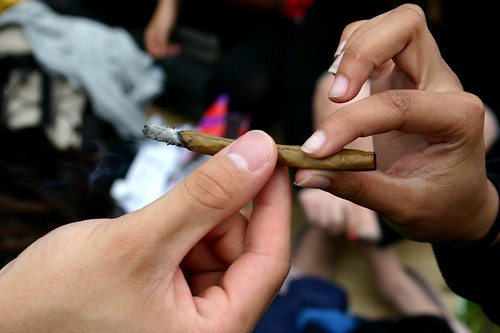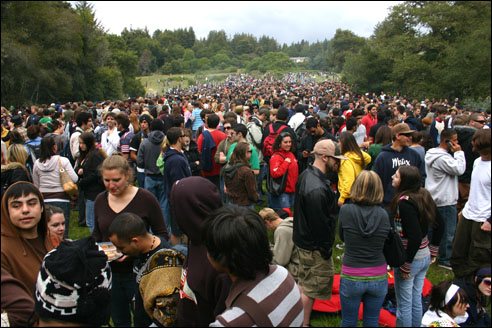
 Wandering the Venice Boardwalk, it might be easy to image a Los Angeles where marijuana is legal and easily available. But while Proposition 19 might have seemed like an easy pass in California — the state home to the hippy movement, first to reduce the maximum penalty for possession of marijuana and first to allow it to be grown and consumed for medical purposes — the reality is a little more complicated.
Wandering the Venice Boardwalk, it might be easy to image a Los Angeles where marijuana is legal and easily available. But while Proposition 19 might have seemed like an easy pass in California — the state home to the hippy movement, first to reduce the maximum penalty for possession of marijuana and first to allow it to be grown and consumed for medical purposes — the reality is a little more complicated.
A poll conduced by the Los Angeles Times/USC on Proposition 19, which would legalize marijuana in California, shows opposition at 51 percent. Of the 441 likely voters polled by telephone, 39 percent support the measure. The poll also hints at the complex divisions between various demographic groups.
Men, for example, are undecided on the issue, while women are more likely to vote against it. Republicans “overwhelmingly” opposed Proposition 19, while the legalization of marijuana is supported by most Democrats and Independents. According to the poll, voters under the age of 40 are more likely to support Proposition 19 with 48 percent indicating a “yes” vote, while 59 percent of older voters opposed it. Only 28 percent of voters 65 and older supported Prop. 19. According to the LA Times/USC poll, Latino voters opposed the legalization of marijuana 2 to 1. White voters also opposed the measure in majority.
Support for Proposition 19 also depends on where you live in California, according to the poll. Researchers found that Proposition 19 was “leading only in the Central Coast counties and running far behind in the largely conservative Central Valley and in Southern California.”
 Left: A celebration of marijuana at UC Santa Cruz on April 20, or “4/20,” courtesy of IndyBay
Left: A celebration of marijuana at UC Santa Cruz on April 20, or “4/20,” courtesy of IndyBay
So, who might be most likely to vote for the passage of Proposition 19? A left-leaning, twenty-something male from Santa Cruz.
And least likely? A right-leaning woman in her late 60s from Bakersfield.
But what about in Los Angeles? This politically and ethnically diverse city could go either way on the vote. What would Los Angeles be like as a city with legal weed?
To begin with, smoking in public would still be illegal. Individuals would be able to carry up to an ounce without breaking the law. Lighting up in front of minors would be a big no-no, and so would driving. However, roadside impairment testing is extremely difficult for police, which may be considered cause for concern. What about the cost to buy marijuana? Well, pot could actually get cheaper. According to the Rand Drug Policy Research Center, the price of marijuana could drop significantly, by as much as 80 percent if legalized. Questions remain as to how much revenue sale and taxation of marijuana would bring into the state, and whether or not anti-marijuana laws would be enforced at a federal level.
How are you planning to vote on Proposition 19? Let us know in the comments box below.
















